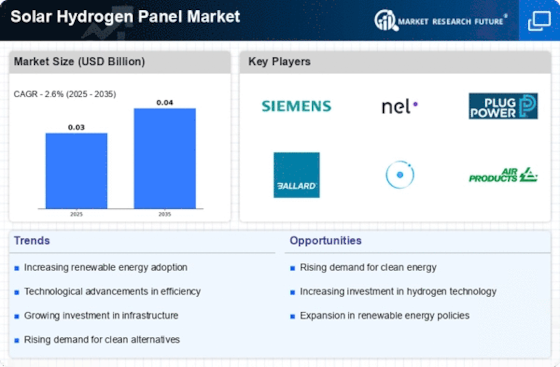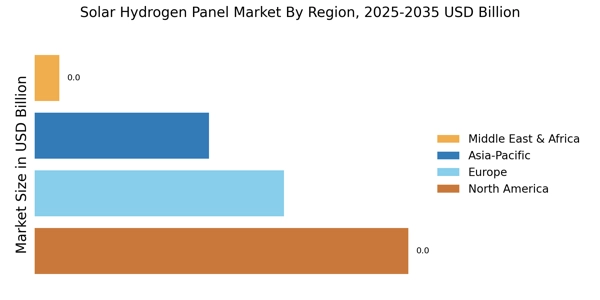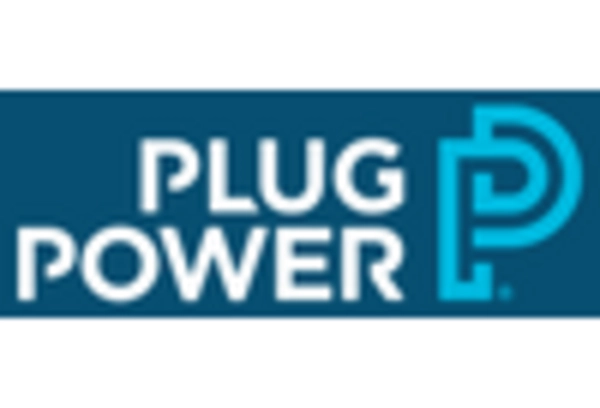Rising Energy Costs
The escalating costs of traditional energy sources are driving interest in the Solar Hydrogen Panel Market. As fossil fuel prices fluctuate and become increasingly volatile, consumers and businesses are seeking alternative energy solutions that offer stability and long-term savings. Solar hydrogen panels present a viable option, as they harness renewable energy to produce hydrogen fuel, which can be stored and used as a clean energy source. Recent analyses indicate that the levelized cost of hydrogen production from solar energy is becoming competitive with conventional fuels. This shift in energy economics is prompting a reevaluation of energy strategies across various sectors. Consequently, the Solar Hydrogen Panel Market is likely to see increased adoption as stakeholders recognize the potential for cost savings and energy security through renewable hydrogen solutions.
Government Incentives and Policies
Government incentives and supportive policies play a crucial role in shaping the Solar Hydrogen Panel Market. Many governments are implementing favorable regulations and financial incentives to promote the adoption of renewable energy technologies. For instance, tax credits, grants, and subsidies for solar hydrogen projects are becoming increasingly common. These initiatives aim to encourage investment in clean energy solutions and reduce the financial burden on consumers and businesses. Recent reports suggest that countries with robust policy frameworks for renewable energy have seen a 30% increase in solar hydrogen panel installations. As governments continue to prioritize sustainability and energy independence, the Solar Hydrogen Panel Market is likely to benefit from enhanced support and funding opportunities, fostering a conducive environment for growth.
Increasing Demand for Renewable Energy
The Solar Hydrogen Panel Market is experiencing a surge in demand for renewable energy solutions. As nations strive to meet their energy needs sustainably, the adoption of solar hydrogen panels is becoming more prevalent. According to recent data, the renewable energy sector is projected to grow at a compound annual growth rate of over 10% in the coming years. This growth is driven by the need to reduce greenhouse gas emissions and reliance on fossil fuels. Solar hydrogen panels, which convert sunlight into hydrogen fuel, offer a clean alternative that aligns with global energy transition goals. The increasing demand for energy security and independence further propels the market, as countries seek to diversify their energy sources. Consequently, the Solar Hydrogen Panel Market is poised for substantial growth as it meets the rising demand for sustainable energy solutions.
Growing Industrial Applications of Hydrogen
The expanding industrial applications of hydrogen are significantly impacting the Solar Hydrogen Panel Market. Industries such as transportation, manufacturing, and energy storage are increasingly recognizing hydrogen as a versatile energy carrier. The demand for hydrogen in fuel cell vehicles and as a feedstock in chemical processes is on the rise. Recent projections suggest that the hydrogen market could reach a valuation of over 200 billion dollars by 2030, driven by its applications in decarbonizing various sectors. As industries seek to reduce their carbon footprints, the integration of solar hydrogen panels for hydrogen production is becoming more attractive. This trend is likely to propel the Solar Hydrogen Panel Market forward, as businesses invest in sustainable energy solutions to meet regulatory requirements and consumer expectations.
Technological Innovations in Hydrogen Production
Technological advancements in hydrogen production are significantly influencing the Solar Hydrogen Panel Market. Innovations such as improved electrolysis methods and enhanced solar cell efficiency are making hydrogen production more viable and cost-effective. Recent studies indicate that advancements in photovoltaic technology have led to a 20% increase in energy conversion efficiency. This progress not only reduces the cost of hydrogen production but also enhances the overall performance of solar hydrogen panels. As technology continues to evolve, the integration of artificial intelligence and machine learning in optimizing hydrogen production processes is likely to emerge. These innovations could potentially lower operational costs and increase the scalability of solar hydrogen solutions, thereby attracting more investments into the Solar Hydrogen Panel Market. The ongoing research and development efforts are expected to further drive market growth in the coming years.

















